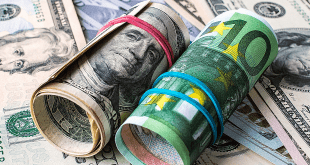The US inflation data dominated the markets in the week ending May 13th. The safe-haven assets ended the trading in a bearish direction led by gold as a result of the rise in the US dollar.
Wall Street ended trading higher on Friday, ending a week of wild market volatility, with relief over signs of peaking inflation offset by fears that tightening Federal Reserve monetary policy would push the economy into a recession.
The gains were driven by a rebound in technology shares and related companies, which incurred heavy losses in recent sessions amid rising Treasury yields and investor concern that the Federal Reserve will raise interest rates more than expected.
Despite Friday’s gains, the S&P 500 and Nasdaq posted their sixth consecutive weekly loss, the longest losing streak since fall 2012 for the S&P and since spring 2011 for the Nasdaq.
The Dow Jones index recorded its seventh consecutive weekly decline, the longest losing streak since the late winter of 1980.
The Dow Jones Industrial Average rose 466.36 points, or 1.47 percent, to close on Friday at 32,196.66 points. The Standard & Poor’s 500 index rose 93.81 points, or 2.39 percent, to 4,023.89 points. The Nasdaq Composite Index rose 434.04 points, or 3.82 percent, to 11,805 points.
The Turkish lira fell for the seventh consecutive session against the dollar on Friday, bringing its losses to nearly five percent since last Wednesday, and heading towards its record lows last December.
The lira fell to 15.4675 against the US currency and settled at 15.4410 per dollar at 0707 GMT.
The lira lost about 15 percent of its value this year, in addition to its 44 percent decline in 2021.
Calendar
The annual pace of headline inflation in the US according to the Consumer Price Index (CPI) fell to 8.3% in April from 8.5% in March. That was above the expected decline to 8.1% YoY. The MoM pace of headline inflation fell to 0.3% in April from 1.2% in March, also above the expected drop to 0.2%.
The preliminary estimate of the University of Michigan’s (UoM) Consumer Sentiment Index for May fell to 59.1 versus an expected 64.0 fall from 65.2 in April, its lowest since August 2011.
UoM’s Consumer Expectations Index fell to 56.3 from 63.0 in April, larger than the expected drop to 62.5, while the Current Conditions Index fell to 63.6 from 69.4, versus an expected small rise to 70.5, its lowest reading since March 2009.
There were 203,000 Initial Jobless Claims in the week ending on 7 May, a little above the expected drop to 195,000 from 202,000 one week ago. As a result, the four-week average number of Initial Jobless Claims rose to 192,750 from 188,500 a week earlier.
The annual rate of US Producer Price Inflation (PPI) fell to 11.0% in April, above expectations for a fall to 10.7% from 11.2% in March. MoM, headline producer price pressures came in at 0.5% as expected, falling back from a 1.6% MoM gain in March.
Oil
Oil prices rose about 4% on Friday, as US gasoline prices jumped to a record high, China appeared ready to ease epidemic restrictions, and investors feared supply tightening if the European Union banned Russian oil.
Brent crude futures rose 3.8% to settle at $111.55 a barrel, and West Texas crude rose 4.1% to settle at $110.49.
This was WTI’s highest close since March 25 and its third consecutive weekly rise, while Brent crude fell for the first time in three weeks.
Meanwhile, US gasoline futures rose to an all-time high after inventories fell last week for the sixth consecutive week.
The AAA Automobile Club said US prices at the pump rose to record highs on Friday at $4.43 a gallon for gasoline and $5.56 for diesel.
Oil prices were volatile, buoyed by fears that a potential European Union ban on Russian oil could tighten supplies, but pressured by fears that the outbreak of the Corona pandemic could reduce global demand.
Gold
Gold fell more than 1% on Friday, marking the fourth consecutive week of decline, as the strong rise of the dollar combined with US interest rates.
The spot price of gold fell 0.7% to $ 1808.89 an ounce, after hitting its lowest level since February 4 at $ 1798.86, and it has fallen by about 4% this week.
And US gold futures fell 0.9% to $ 1808.20.
Federal Reserve Chairman Jerome Powell said Thursday that the battle to control inflation “will involve some pain” as the impact of higher interest rates can be felt.
The dollar index is set for the sixth consecutive weekly gain, hovering near a 20-year high.
Although seen as a hedge against inflation, gold does not yield any interest and is sensitive to rising US short-term interest rates and bond yields.
Spot silver rose 1.6 percent to $20.98 an ounce, but is down about 6 percent this week, the most since late January.
Platinum fell 0.8% to $936.51, and palladium rose 1.5 percent to $1936.83, after falling more than 8% on Thursday.
Europe
European shares rose on Friday, posting their first weekly gain in five weeks, as a wave of bargain-hunting dominated after concerns about monetary tightening and slowing global economic growth.
The pan-European Stoxx 600 index rose 2.1 percent, with the travel and leisure and banking sectors leading the way up.
Global markets, especially the US stock market, were characterized by highly volatile trading this week as investors fear that tight financial conditions and the US Central Bank’s readiness for a series of interest rate hikes to contain inflation will push the economy into recession.
On Thursday, US Federal Reserve Chairman Jerome Powell reiterated his expectation that the bank would raise interest rates by half a percentage point during the next two monetary policy meetings, alleviating the concern of a larger 75 basis point increase that some investors had been expecting.
Bitcoin
Bitcoin rose 3.87 percent to $2,9986.45 at 22.06 hours on Friday, up $1,119.25 from its previous close.
The world’s largest and most popular cryptocurrency is up 18.1 percent from its lowest level in the year when it reached $2,5401.05 on May 12.
Ether, the world’s second-largest cryptocurrency, rose 6.49 percent to $2,077.03 on Friday, up $126.58 from its previous close.
Ukraine-Russia crisis
Russia said it will suspend electricity supplies to Finland starting tomorrow, Saturday, May 14, as tensions rise over Finland’s bid to join NATO in the wake of Russia’s conflict with Ukraine.
RAO Nordic, a subsidiary of Russia’s state energy company that sells electricity, blamed the suspension for not receiving payment for electricity sold in May, and said as a result it could no longer pay more electricity from Russia.
 Noor Trends News, Technical Analysis, Educational Tools and Recommendations
Noor Trends News, Technical Analysis, Educational Tools and Recommendations





